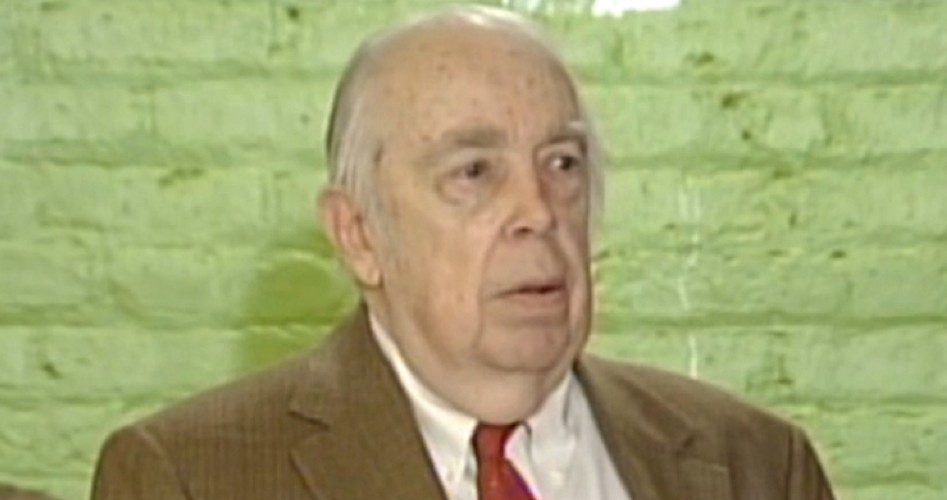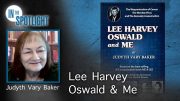
One of our greatest conservative journalists has died at age 80, of pancreatic cancer. Death took M. Stanton Evans (shown) on March 3, but the impact of his life will continue through his eight books, multiple articles, and determined leadership in the cause of liberty and limited government.
The capstone of Evans’ life was his monumental Blacklisted by History, an examination of Senator Joseph McCarthy and his historical impact. Evans devoted many years to researching the life of the stalwart Republican senator from Wisconsin, best known for his fight against Communist subversion inside the U.S. government. In a review for The New American (March 17, 2008), John Birch Society President John F. McManus wrote, “All the books about McCarthy, both pro and con, must now stand aside.” McManus argued that Evans had “produced a masterful, scholarly, and extremely thorough 664-page compilation of evidence completely exonerating the man whose name has been made a destable symbol of unfair accusations.”
Writing in Human Events, Evans responded to the use of the Communist-coined term McCarthyism by supposed conservatives. “How ironic, then, to have conservative spokesmen at talk radio shows, the blogosphere or Fox News robotically utter liberal falsehoods about McCarthy.” Evans speculated that these conservative commentators gave no hint that they “know anything about the subject”: “[It] was painfully clear that the talkers knew nothing of McCarthy,” he noted, “but were simply reciting in half-remembered phrases the standard liberal line about him.”
One commentator who did admit he was wrong in his initial beliefs about McCarthy, after reading Stan Evans’ book about him, was talk show celebrity Glenn Beck. On June 24, 2010, Beck aired a program detailing how the release of FBI files and the World War II-era Office of Strategic Services has vindicated the charges made by Senator McCarthy that there were many Communist spies inside the U.S. State Department.
Beck interviewed Evans, and told him how Blacklisted by History had changed his mind about McCarthy. “I don’t want to believe this,” Beck told Evans, recalling his first thoughts when Evans’ book was first published in 2007. “I put it down and went, “I am not ready to hear that. I can’t handle that.” But, Beck then told his audience that after he finished the book he was ready to say, “Please, America, read this book.”
Evans told Beck that in his research of McCarthy, “I found a lot of stuff missing, a lot of stuff had been censored, a lot of stuff that was in the records in one place but blacked out in another place. Mostly what I found was that the FBI files, which backed up what McCarthy was saying, had been withheld for 50 years.”
Had Evans’ only contribution to the cause of conservatism been his defense of McCarthy, his place in the conservative pantheon of heroes would be secure.
But Evans had a lifetime of accomplishment long before the publication of Blacklisted by History. His upbringing no doubt played a major role in his conservative direction in life, being reared in the home of conservative college professor Medford Evans and classics scholar Josphine Stanton Evans. He grew up in Texas, Tennessee, and Washington, D.C. His father was a frequent contributor to American Opinion magazine, a forerunner of The New American. Medford Evans wrote his own defense of McCarthy, The Assassination of Joe McCarthy, shortly after the Wisconsin senator’s death in 1957, detailing the years of character assassination of the man.
Stanton Evans graduated magna cum laude from Yale in 1955, with a degree in English, which he followed up with economics graduate work, studying under Ludwig von Mises. While at Yale, Evans read One Is a Crowd, by libertarian Frank Chodorov. He later said that the book opened up more intellectual perspectives than did the entire Yale curriculum. Chodorov, editor of The Freeman magazine, soon hired Evans as an assistant editor. “Chodorov probably had more to do with the conscious shaping of my political philosophy than any other person,” Evans later recalled.
The next year, Evans joined the staff of the newly launched National Review magazine, serving as an associate editor until 1973, before taking over as the managing editor of Human Events. He remained a frequent contributor of Human Events until his death.
Evans supported the “fusionist” efforts of National Review co-editor Frank Meyer, who desired to see the joining together of the traditionalist and libertarian tendencies of the conservative movement. “The idea that there is some sort of huge conflict between religious values and liberty is a mistatement of the whole problem. The two are inseparable,” he insisted.
Evans was among the founders, in 1960, of the Young Americans for Freedom, writing their founding charter, the “Sharon Statement,” considered by many one of the greatest summations of conservatism ever published. From 1971-1977, Evans was chairman of the American Conservative Union (ACU). He led the ACU to denounce the administration of President Richard Nixon, writing the ACU report condemning his liberal policies. He later led the ACU to urge former California Governor Ronald Reagan to challenge President Gerald Ford for the Republican Party nomination in 1976.
All conservatives should be grateful for the 80 years of life of M. Stanton Evans.
Photo: M. Stanton Evans



